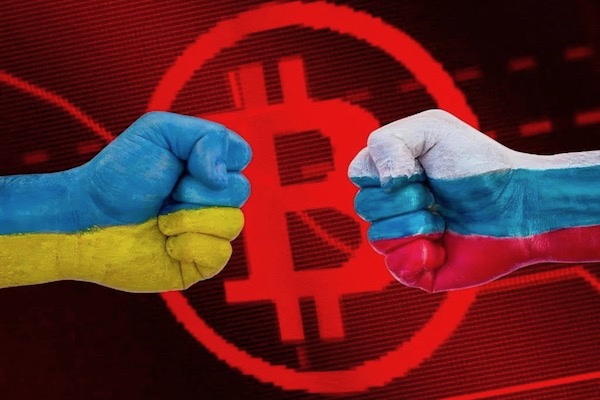Published on the 09/03/2022 | Written by Heather Wright

Will plans to use crypto to avoid sanctions be thwarted?…
As economic sanctions take force and the ruble tumbles and the Russian economy teeters on the brink of collapse, Russia, and its wealthy oligarchs, are reportedly looking to cryptocurrencies to evade sanctions. But their efforts might be little more than castles in the air at the moment, according to some experts.
The conflict has thrust cryptocurrencies back into the spotlight with organisations around the world looking at the potential for digital currency to be used to circumvent sanctions aiming to thwart Russia’s access to foreign capital.
Those sanctions include the US blocking Russia’s central bank from transacting in dollars, and limiting the country’s access to $630 billion of its foreign reserves. Russian assets have also been frozen by the notoriously neutral Switzerland. New Zealand’s proposed ‘autonomous sanctions regime’ against Russia would also enable assets in New Zealand to be frozen, preventing New Zealand’s financial system from being used as a back door to get around sanctions imposed by other countries.
“We severely doubt whether cryptocurrency would allow a sanctioned person to transfer large sums of money without it being noticed.”
Meanwhile Swift, the interbank messaging system which coordinates global transfers, has removed key Russian banks from its system, and Visa, Mastercard and internet payments giant PayPal have all suspended their services in Russia.
The G7, which includes Canada, France, Germany, Italy, Japan, the UK and the US, and the EU are among those looking at ways to stop the use of cryptocurrency by Russia to circumvent the sanctions.
Russia could, in theory, use cryptocurrencies to evade sanctions in a number of ways, including providing the opportunity for wealthy Russian oligarchs and businesses to send money offshore.
The decentralised, borderless nature of digital currencies means could, in theory, provide a means to evade sanctions.
Certainly, since Russia’s invasion of Ukraine in late February, transactions for crypto currencies in the ruble have surged, suggesting Russians are moving money into crypto.
There’s also concern that ransomware could become a means of using crypto to evade sanctions. Chainanlysis says Russia is leading country in cryptocurrency adoption, ranking 18th on the Global Crypto Adoption Index, but there’s a disproportionate share of activity in crypto-based crime, including ransomware. Roughly 74 percent of all ransomware ‘revenue’ in 2021 – over US$400 million of cryptocurrency – went to ransomware linked with Russia.
It wouldn’t be the first time crypto has been used to bypass sanctions. Iran used Bitcoin mining to earn hundreds of millions of dollars in crypto that can be used to purchase imports and bypass trade embargoes.
North Korea too, has used stolen crypto to mitigate international sanctions and fund its missile program.
And Cyprus’ 2013 financial crisis was one of the first major cases where cryptocurrency was used for money laundering.
But Teunis Brosens, ING head economist of digital finance and regulation, says concerns that cryptocurrencies are a sanctions-busting tool seem ‘exaggerated, for now’.
He says crypto providers have to apply global sanctions against Russia like any other businesses.
“Like any other legal entity, crypto-asset service providers are obliged to apply sanctions. They have to freeze assets and bar transactions from sanctioned people and entities.
“Indeed, several large crypto exchanges have indicated they are doing so,” Brosens says.
He says denying all Russians access to crypto services – as called for by Ukrainian vice Prime Minister and minister of digital transformation, Mykhailo Fedorov, meanwhile, who took to Twitter to call for crypto platforms to block Russian accounts – isn’t in line with the chosen sanctions approach so far.
“Western policymakers have made the choice for sanctions not to apply fully across the board,” he notes.
That could, however, change, he adds.
He also notes that the traceability of crypto transactions shouldn’t be underestimated.
“Yet even if crypto-asset service providers in far-away jurisdictions turned a blind eye to sanctioned persons transacting on their platform, chances are that these transactions will, either in real-time or after the fact, be noticed.”
The same applies if intermediaries are avoided altogether by transacting using ‘self-hosted’ wallets, he says.
“As on-chain forensic research has become more advanced over the years, it is becoming progressively more difficult to hide on the blockchain which is keeping a perfect history of transactions for all to see.
“Coins can, with some effort, be traced back to the very last ‘satoshi’, bitcoin’s smallest unit. Recent reports of ransomware money being recaptured, and arrests made for crypto exchange hacks made years ago, attest to this progress. “Hence we severely doubt whether cryptocurrency would allow a sanctioned person to transfer large sums of money in or out of Russia without it being noticed and responded to.”
Also doubtful about crypto’s sanction evasion potential is Changpeng Zhao, founder of the Binance cryptocurrency trading platform which is following international sanction rules ‘strictly’ but has stopped short of a blanket ban on Russian users.
Zhao says crypto is ‘too small’ for Russia.
“If we look at the crypto adoption today, there is probably about three percent of the global population with some kind of crypto exposure (ie, owning some crypto). Of those, most only have a small percentage of their net worth in crypto. Less than 10% on average. So, there is probably only less than 0.3% of the global net worth in crypto today. This percentage applies equally to Russia.”
Zhao too, believes the use of blockchain in crypto transactions means crypto is ‘not an effective tool for illicit activities’.
“Crypto is… too traceable. And governments around the world are already very adept at tracking it,” he says, citing the Bifinex hack, where the US Department of Justice this year retrieved US$3.6 billion in Bitcoin stolen back in 2016.
Meanwhile, the sanctions could push Russia further down the road to building its own alternatives. The country has been keen to increase the independence of its financial systems in recent years and has its own bank messaging system, SPFS, as an alternative to Swift, and its own card payment system, MIR.
It’s also developing its own central bank digital currency.
And as a side note, the Ukraine too, has been harnessing crypto – its calls for digital currency donations to back its war efforts have seen more than $59.7 million raised for the government and an NGO providing support to the military, according to crypto compliance company Elliptic.



























